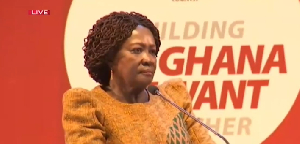Business News of Monday, 1 September 2014
Source: B&FT
Draft law to confiscate illegal mining equipment
Government says it is drafting a new law to give legal backing to state agencies and officials to confiscate assets used for illegal mining operations.
The draft law being developed by the Ministry of Lands and Natural Resources (MLNR) is to clamp down on illegal mining, which is fast destroying the country’s arable land and water resources.
Minister of Lands and Natural Resource, Nii Osah Mills who made this known during his maiden familiarisation visit to the Minerals Commission in Accra, said the current Minerals and Mining Act does not empower state agencies and officials to seize equipment used by illegal miners.
“I will expedite action for the law to confiscate assets of illegal miners, and I’m hopeful the law will be passed before I complete my tenure as the sector minister,” he said.
The Minerals Commission is seeking to amend existing small-scale mining laws to impose stiffer punishment on any individual that engages in illegal mining.
Presently, the law stipulates that anyone who engages in illegal small-scale mining be fined 14,000 penalty units. A unit is valued at GH¢12. Efforts will be made to seek amendment of the law to enhance the level of punishment.
The country’s laws stipulate that foreign companies are only allowed to work on large, open-pit mining operations.
But there is evidence -- which is confirmed by activists -- that foreign entrepreneurs are also illegally controlling small-scale operations behind the scenes, typically through a local intermediary.
The influx of these immigrants into the country’s small-scale mining sector, hitherto reserved for Ghanaians, has now become a national crisis.
So far, Chinese, Indians, Russians, Spaniards, Burkinabes and other West African nationals have been found involved in the illegal mining business.
A recent Wassa Communities Affected by Mining (WACAM) study showed around 120 Chinese were living and working in Dikoto, a village near Wassa Akropong, and three surrounding villages in the Western Region -- just one of many pockets of activity whose legality is highly suspect.
Entertainment










